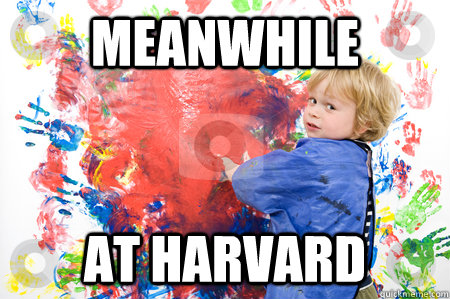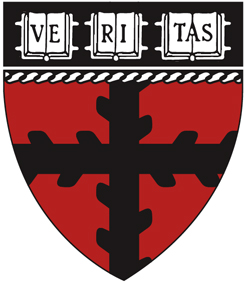 |
| Source: the Interwebs (QuickMeme). |
Usually somewhere around this point of the conversation ("You do computer science? At Harvard? I didn't even know there was a department."), my friends from more tech-savy places (yes, that's you, MIT people) throw in a verbal equivalent of the meme on the left. And, to be completely honest, in the beginning of my college times, I couldn't agree more and was trying quite seriously to transfer. I mean, I had just finished high school and was hoping I could code forever and that I'd never have to write another essay again. Now with my newly acquired alumnus wisdom, I'm extremely happy that I didn't transfer. This post is supposed to explain why. And yes, it suffers very strongly from confirmation bias. But such is life...
What's the whole fuss about?
If you are new to the US higher education system (I most certainly was when I innocently landed in Boston some four years ago), the fuss is about what people call liberal arts education. In most of Europe, people apply to universities with a specific major in mind, and spend their four years there rarely leaving their chosen area of interest. On the contrary, in liberal arts, the main driving principle is not focusing on facts or specific skill sets, but developing general critical thinking skills. In that light, students are allowed to choose majors later, and generally encouraged to try new areas rather than focus on a single one. Roughly speaking, colleges in the US implement the liberal arts philosophy, but to a varying extent. If you want to read up, eHow gives an unbiased overview, The Wall Street Journal leans toward the specialization camp, and Dickinson College blatantly says liberal arts rule all.In case you haven't guessed, Harvard is more of a liberal-leaning school. Most majors leave a lot of space for elective courses (roughly 38% of the average workload), and there is a college-wide general education program that accounts for 25% of the overall workload. Also, students get to choose their concentrations as late as the middle of the second year. And this orientation is not only true on the administrative level. If you take a look at the chart at the bottom of this post, you will see that only 30% of the graduating class of 2011 chose a major somehow related to sciences (this includes all sciences ranging from biology through astronomy to engineering), while the rest ended up in concentrations much more closely aligned to the principles of liberal arts education.
And in case you also haven't guessed already, I wasn't and still am not the biggest fan of liberal arts out there. Yeah, critical thinking skills are great, but we also live in a post-industrial society, where the demand for specific skill sets is constantly growing. The days when philosophers could grasp all the world's knowledge are long gone and never coming back, since the amount of scientific knowledge has been following an exponential curve. And do I even dare bring up the money argument. So, at the beginning of college, I wasn't exactly ecstatic about the requirement of spending 25% of my time on absolutely unrelated areas, like moral or ethical reasoning.
 |
| The School of Engineering and Applied Sciences will gladly let you shoot yourself in the foot. Source: SEAS communications. |
Liberal might not be that terrible...
One of the first things I learned very early on was that "liberal" could be a good thing. Don't get me wrong, I didn't become an opera-singing hipster wondering if they should concentrate in Classics or English while practicing their Latin just for kicks. In fact, quite the contrary, for me "liberal" meant that requirements were quite lax and I could easily take as many courses as I could cram in my schedule and in virtually any order without paying really close attention to prerequisites. A lot of that was due to the fact that, as my MIT friends never failed to notice, the Engineering school at Harvard is quite small compared to both other departments in the university, and other CS departments elsewhere. And, boy, is that one of its greatest assets...As I already mentioned, in a small department, formal structure isn't the very first concern. From my perspective, this meant that I could take advanced courses along with the intro ones from very early on, as long as I was willing to step up my workload a notch. So, in freshman spring that "notch" ended up being 50%, with one of my extra courses being as specialized as "Low-Power Computer Architecture". In the next few years, I did end up specializing mostly in architecture on top of the typical requirements for a bachelor of arts in Computer Science, simply because I found (and keep finding) the area interesting. Now, after a step back from the school mindset, I realize that a system that insists on a broad foundation and allows people interested enough in an area to specialize indeed sounds like a better and more democratic option than forcing everyone to specialize. Of course, with the downside that those who do choose to specialize must invest some additional effort.
But I digress. After all, the purpose of this post was to convince myself I did well not transferring to MIT, not to generalize on systems of higher education. So, we're back to freshman spring where I was happily taking low-power architecture. Which, by the way, was taught by my then-to-be-adviser, David Brooks. And that brings us to my other point in favor of a small academic department -- the small student-to-faculty ratio. In such an environment, one gets to interact with faculty from relatively early on. And that's a great thing.
Not only because of the obvious and formal benefits like good recommendation letters, but simply because faculty tend to be smart people and it's very fulfilling to be able to work with them closely on challenging problems. Or to blatantly walk up to their office and say "why don't we create a permanent course on the AI of robotic soccer?". In my case, I did join David's lab for the next three years and did some (hopefully) good work under him. I ended up enjoying it so much that I decided to spend X more years in the same lab until I get another diploma reading "Doctor of Philosophy" (the "philosophy" part will probably require another blog post to reconcile). I also did ask the AI-of-robotic-soccer question and the end result was quite fun for a semester. But I don't think either of those interactions would have been possible or at least easy under a big school dynamics, where I would just be a random undergrad out of the 200 or so takings someone's class.
So, if I am to sum up, liberal arts does not necessarily mean "bad in specific areas". In fact, because of the small school dynamics, the "liberal" setting can lead to a more specialized academic education, if the student is motivated enough about their area.
But liberal is definitely more varied...
I did spend a lot of my undergrad time in MIT and there are a few people whom I consider friends there. They are predominantly extremely smart, some even scarily so. But the 30% that chose to specialize in "sciences" along with me at Harvard are no less smart or no less passionate about their field. They were just as willing and motivated to stay up until 6am in the dining hall to work on that electronics problem set, or just as open to hack all night until our operating system got race-free virtual memory.But in addition to science-y folks, in my four years I've met people who aspire to be bankers, traders, lawyers, doctors, teachers, actors, filmmakers, consultants or anything in between. And I got to experience their different points of view, albeit in some cases briefly. I've learned more about stock markets from looking at Apple's fundamentals with my former roommates than from three courses in economics, and I've developed some interest in how markets and companies work. I've been near people who seriously played American football, fencing, basketball, lacrosse, and seen the dedication it takes to play a sport for real. I've hung out with people who are serious about acting, who wrote operas, played various instruments, or did public speaking, which showed me the guts it takes to go in front of an audience and do your thing. And none of these encounters were forced or fixed by a curriculum in any way, but were mostly a product of having a lot of people passionate about completely different areas in one place.
And most importantly, none of that came at the expense of a good specialized education but mostly as an added bonus. So, yeah, that degree that I got does mention the word "arts". But I did live to tell the story. In fact, analytic-me who hated the guts out of every 200+ word essay is now writing a blog for fun. So, the whole bachelor of arts thing might not have been that terrible an idea...
| Concentration areas of the class of 2011. Source: Harvard Magazine |
No comments:
Post a Comment